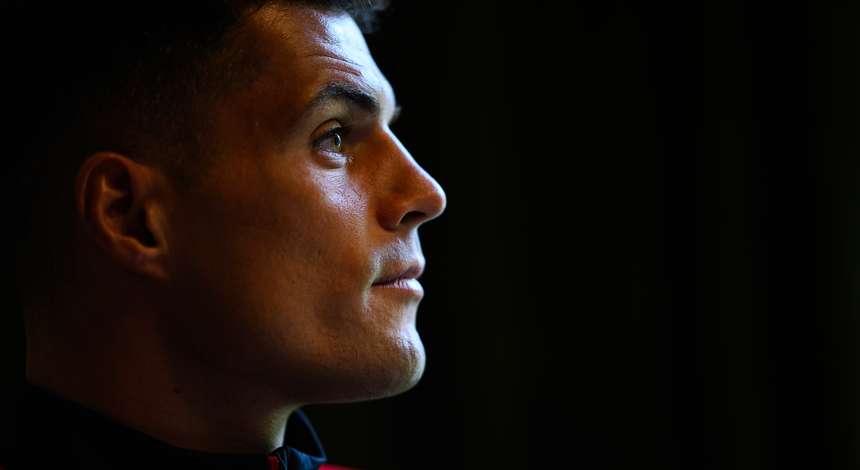
You had perhaps the best season of your career at Arsenal. Why did you want to come to Bayer 04 and get back into the Bundesliga?
Xhaka: I had seven great years at Arsenal. That applies particularly to the three and a half years under Mikel Arteta. A coach I was able to learn a lot from. But after seven years at the club I felt that I needed a new challenge. It's really, really great playing in England and also intense given the huge amount of competition. But if you put football and all the advantages to one side then there are other elements that many people don't talk about and that are not so simple.
What are you thinking of?
Xhaka: For me, money or the luxury lifestyle, which is a cliché for football players, doesn't play a big role. Of course, our lifestyle is great but not always automatically simple. For example, my wife and I didn't have our families with us and no close friends. Of course, you always have two or three people around you. But private life, I have to say, is generally not so easy. There's also a lot of stress in a football player's life in England. If you go out then you are watched much more than for example in Germany. But the private things weren't the only reason for the move. I think the long term and the discussions with Bayer 04 convinced me straightaway. I'm really glad that I've taken this step.
You also had a difficult phase on the pitch at Arsenal: You are booed by your own fans when you are substituted against Crystal Palace in October 2019 and you made a couple of provocative gestures – and the scandal was perfect.
Xhaka: I still don't know the reason for the boos. It really was a surprise. On the Monday before the game I had talks with the management about a contract extension. The game was on Saturday – and everybody was there: my parents, my wife, my agent. When I got home after the game and the incident then I was determined never to wear that shirt again. It really hurt me and at that moment it was completely impossible for me to play for Arsenal again and the fans who booed me for no reason from my point of view.
Why did you stay?
Xhaka: I had great support from my parents, above all for my papa. When I went to Gladbach at the age of 19 I had a difficult phase and wanted to get away. Back then my papa said to me:' If you run away now then you will always run away.' I stayed and everything was on the up. At Arsenal after the incident my papa said to me for the first time:'It's over. We've got to go.' Our bags were packed and I had an agreement with Hertha. I was ready to go.
And then…?
Xhaka: …Mikel Arteta was suddenly the new coach. He wanted to hear the story from my perspective. Then I said to him: 'Listen I have great respect for you. But I'm not prepared to put the shirt on again. My time at Arsenal is over. It really hit me, it can't carry on.' The next day he wanted to speak to me again. And I don't know how but he convinced me so much that I made a decision without my parents for the first time in my life. After then it was all on the up and I received a lot of praise in England because I'd shown character. In the end my last game at Arsenal was met with big applause and a farewell song to leave to. That really was a goosebumps moment.
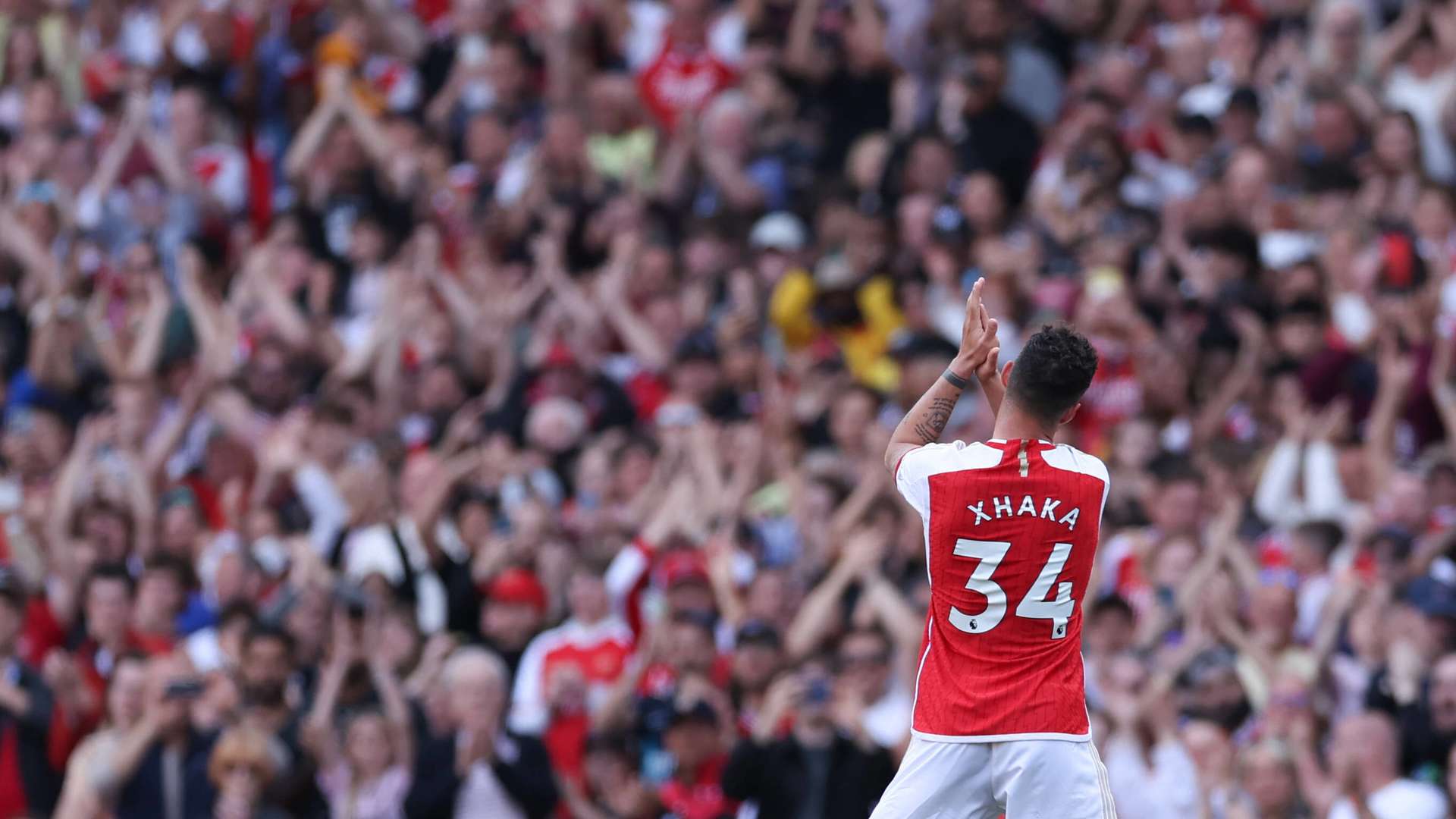
You won four trophies with Arsenal – does the experience of leaving the club with your head held high in the end mean more than the two wins in the FA Cup and Community Shield?
Xhaka: I'd never swap that experience for a title. Perhaps there's never been a turnaround like that with fans in English football. That brought me a lot of sympathy within Arsenal. The people there saw: I was 27 and devastated. I didn't really show my family completely how much it hurt. But when I was alone in my room or in a hotel then it really was very difficult. I've learned a lot from that. At the end of the day it's only football. There are always people who have a go at you. You have to be really strong mentally. And thank God I managed it. I'm really proud of myself because of that – if I can say that.
What do you take from that experience for your time at Leverkusen?
Xhaka: I know now how it feels to be rock bottom. There are players in every team who have problems. I can see that differently now as a 30-year-old. Bayer 04 have also signed me to stabilise this young team. I'll try that at every level – including mentally. I don't want to be the father figure or the boss. Yet it must be clear to everyone that you have to work hard on yourself to be successful and that there are many factors for that in football: sleep, nutrition, recovery. But we also had a young team at Arsenal and you felt a bit that you could never handle the lads now how I used to be handled.
What's changed?
Xhaka: It's a bit simpler for the lads these days. I can still exactly remember when I moved up to the first-team at FC Basel. When you train with the first team so young then you obviously feel it in your legs and back a bit more. But then it was on to the massage bench. Then came the older players like Alexander Frei, Marco Streller und Benjamin Huggel and just said: 'What are you doing there?' And I said:' Yes I'm tired.' Then all I heard was:' Stand-up.' (He laughs) You don't get that any more. Because the younger ones move on earlier or perhaps the old ones aren't as tough any more. You need a good mix: promote respect but also help the lads. To me back then it was a great lesson and I wouldn’t like to have missed it. But I'm perhaps a bit old-fashioned and believe that you play the way you train. That means you should push yourself to your limit every day.
What does your sort of team leadership look like and does help to speak five languages?
Xhaka: It's definitely an advantage. I'm somebody who likes to communicate. I've got a really good sense of when a player really isn't feeling so good and I can talk to players. Those are things that belong to a role like that – and you haven't got that when you are at the start of your 20s; I didn't anyway. But over the course of the years and in other countries you learn a lot. At Arsenal the respect amongst each other and towards the staff was very big and dealing with each other was very important for Mikel Arteta we had to know the name of all the staff working in and around the training ground and that shapes the climate within the team. In England players do more of their own thing and there isn't so much togetherness after training. The German mentality is a bit tighter and more binding. That suits my character.
You have won titles with Basel and Arsenal and now you have a long term contract at Leverkusen to 2028. Have you set yourself a target to win your first title in Germany in that time?
Xhaka: I firmly believe that it is possible with Bayer 04. And, in general, you should think big. But you also have to do something to achieve that. I'm convinced that we can win something with this team. Everything is possible in football and there's not just the trophy that's awarded after 34 games. There are so many great titles you can win. (He laughs)
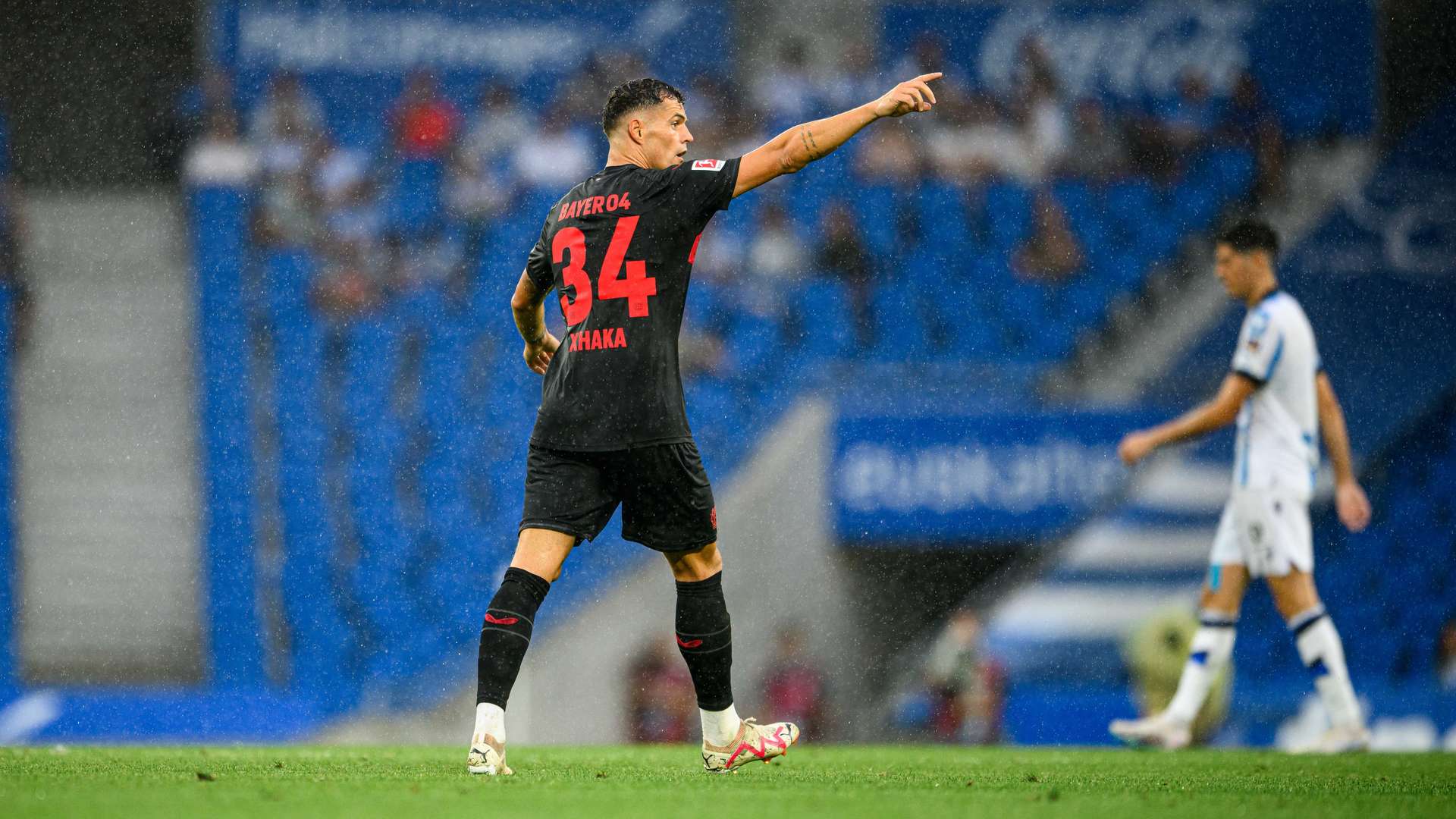
Your trophy cabinet is already full and in 2009 as a 15 year-old you sensationally won the U17 World Cup with Switzerland. What are your memories of that?
Xhaka: I used to be thin, smaller and actually not so advanced as the others. I only got into our U17 side because a teammate was injured and I was the 22nd man in the squad. But for me that was better than eleven against eleven in training. It was the first big chance for me. I came out on top at the training camp and played in all the World Cup games – as a winger. We ended up as champions of the world and that was incredible. Then the doors just opened.
You seem very reflective. But back then as a teenager – U17 World Cup winner, your professional debut, the move to Gladbach – it went quickly and rapidly upwards. Did you manage to keep your feet on the ground?
Xhaka: I did that when I moved to Gladbach in 2012 with the record transfer back then of 8.5 million euros. I really thought I have to do everything now; throw ins, the penalties, the free kicks, the goal kicks. I moved then as a double winner, came into the dressing room and all that was said was: 'Hopefully we don't go down.' That was a slap in the face for me. I wanted to play at the top of the league. And I said that in public. (He laughs) After that I was taken apart a bit by the German media. My performances didn't live up to what I expected and I was rightly on the bench up to the winter break. That's why they said he wants to move on. Until my papa said to me: ' Head down, feet on the ground and work.' Everything clicked and I said to myself: That's enough. I wasn't at the top with an inner conviction that I was the biggest. Now I worked as I used to work. Looking back, I think mistakes are all part of it. I very quickly recognised that, thank God. Without them I might not be where I am today.
Was your father the person you listened to most at that time? It was also a phase in life where you don't necessarily want to hear every piece of advice…
Xhaka: My papa was the driving force of my career. He was a football player in Kosovo and then he had to give up his career. He suffered a broken leg at a time when medical care wasn’t so good. In addition, he had to flee for political reasons and was finally in jail for three and a half years. They made the decision to move to Switzerland for the benefit of the family. I was born there, my parents brought me and my brother Tauland, who is also a player, and this courageous decision enabled us to have the life that we have now. Therefore, they gave up life together with their families. I'm very grateful to my father and I always listen to his analysis. He used to always record our games on television on the video recorder and then he went through them over the full 90 minutes. My papa has never praised me to this day, where I’m now 30 years old and a professional player for more than ten years.
Did you wish that or do you hope that it might still happen?
Xhaka: That's my challenge. (He laughs) That, one day, he says when we're sitting together: 'Okay finally you’ve had a really good game.' But he always find something. So he fostered this special mentality in me. I'm very grateful for this mindset.
You have had completely different opportunities from your father and you've also taken them. Flight, prison, new start in another country – do the experiences of your father help you stay focused and also humble?
Xhaka: When I went to Gladbach at the age of 19 my parents separated for me and my brother but my papa went with me to Gladbach. I wasn't ready to live alone and it was perhaps also a signal from my father according to the motto.' Listen, I'm doing that for you. I'm doing that for our family. Don't take the wrong direction.’I earned well at Basel and at Gladbach the sums were bigger. But it's not easy to handle money when you're 19, you don't have any friends in Germany and your family is far away.
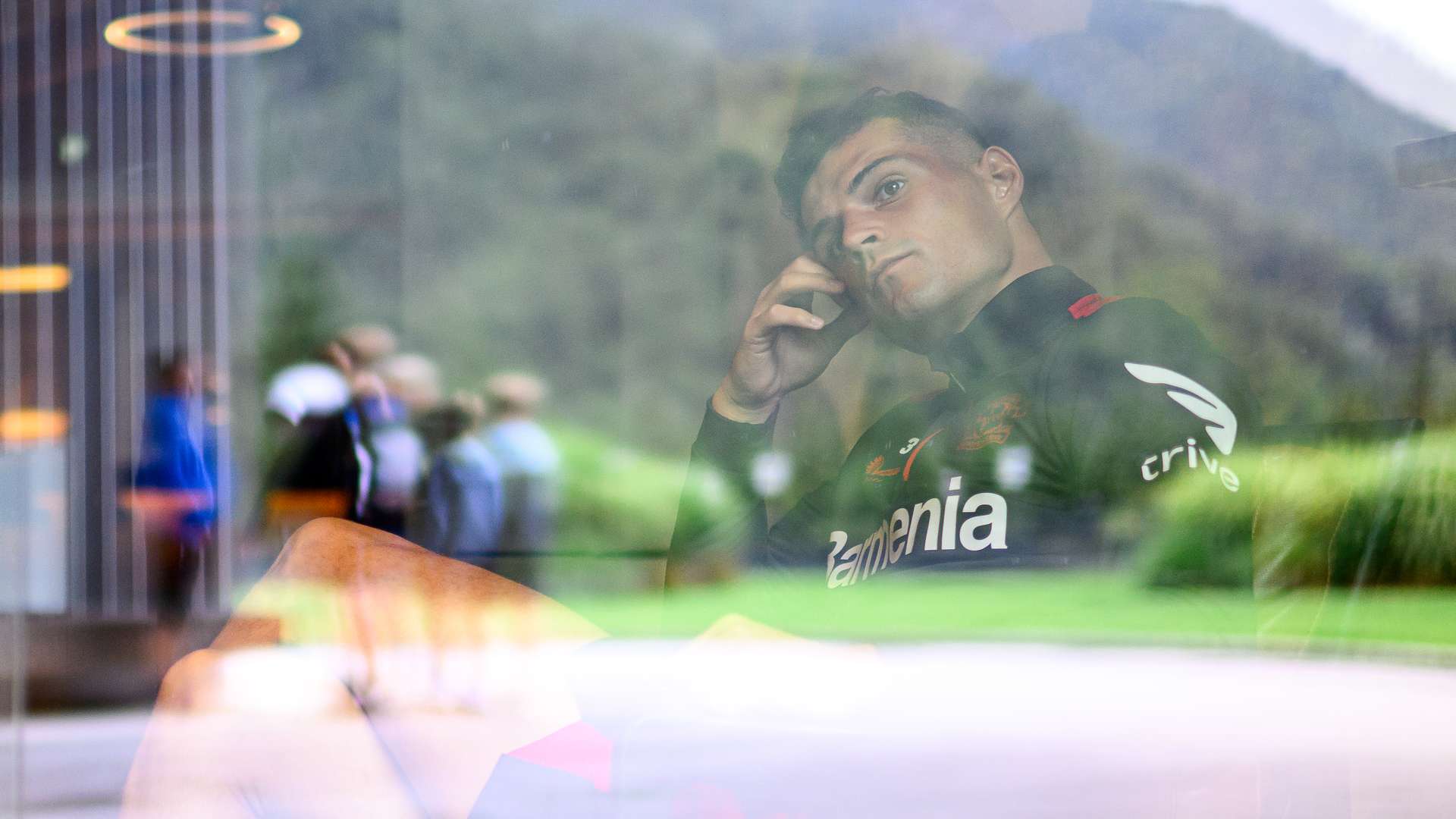
How long did your father stay?
Xhaka: After 18 months I got to know my wife and I said to my parents:' Listen up it's more than enough.' Joking aside. I felt back then that my parents were more and more distant from each other. And I didn't want that. My parents then lived together again and have survived together as a couple. But all they did without is obviously always in your head – as motivation and as a feeling of giving something back and honouring my parents by playing.
You grew up in financially tricky times. What do you think looking back at that time now?
Xhaka: We are outdoors a lot, played a lot of football and our parents found it difficult to get us home. If we had to go in in the evening sometimes didn't have a ball any more. We made a ball out of ten pairs of socks and played then from door to door. That's how it was until he moved to Basel. Back then we smashed a light and my brother had to have stitches on his head because he was injured by the shards of glass. He can still see the scar. (He laughs) But we had a great childhood. I think it's a pity that today's youth spend so much time at their consoles and on their mobile phones. But times have changed and we can hardly influence that. But I hope that it will change again some time.
You have often spoken a lot about your family. It's an unusually strong connection. Are there never competitive thoughts between you and your brother Taulant who plays at FC Basel?
Xhaka: Now I've got two daughters, two and four years old, so that's three women in the house. My family is the be all and end all for me I speak to my parents, my brother, my wife and my children ten times a day easily. Above all, with my brother who is 18 months older. I know what he's been through. We both played in the same position and then he was loaned out as the older one. That wasn't so easy. Then he decided to play for Albania and not for Switzerland like me and we faced each other in the 2016 European Championships. But we always encourage each other in spite of a normal rivalry between brothers. On top of that, that includes always allowing everything the other one and being able to talk about everything. Then in spite of the life as a football player with all its advantages there's nothing better than having such a connection with your family. I'm very grateful for that.
Related News
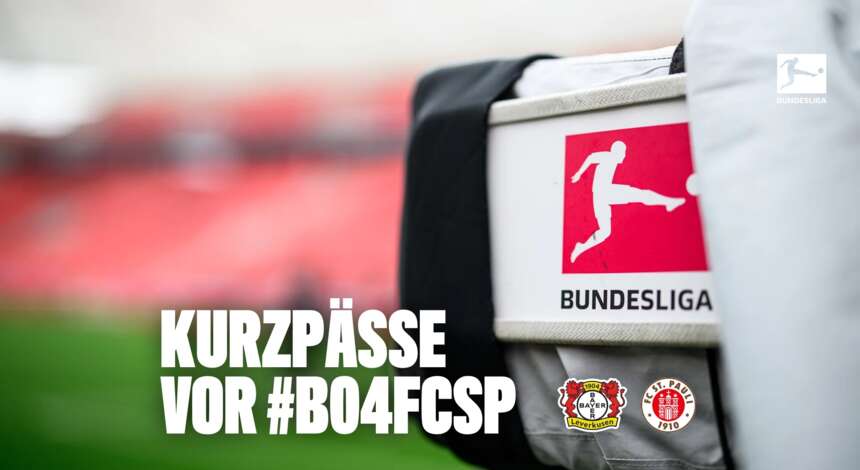
Matchday news #B04SCSP: Targeting third win over optimistic St. Pauli
Barely two weeks since beating St. Pauli in the DFB Pokal quarter-finals, Bayer 04 again welcome the Hamburg club to the BayArena for Matchday 22 in the Bundesliga this Saturday (kick-off: 15:30 CET). The visitors received a welcome confidence boost last weekend with a win over VfB Stuttgart, but the head-to-head record is still very much in Leverkusen’s favour, which Kasper Hjulmand’s team will look to maintain. Here’s all you need to know ahead of the game in our matchday news.
Show more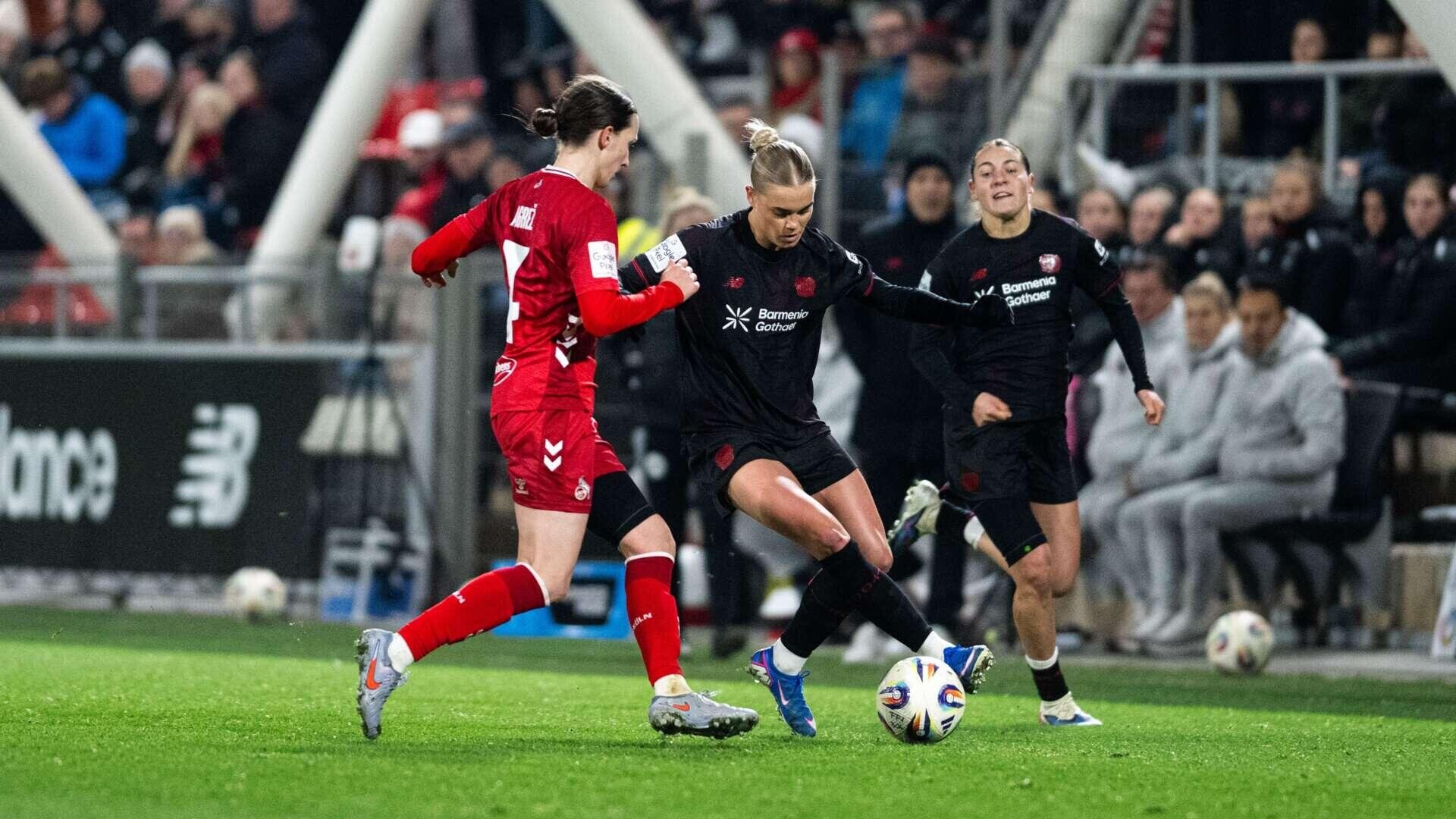
Women: TV-highlights of 2-1 win in derby against Köln
Werkself-TV shows the highlights of the Bayer 04 women's 2-1 win against FC Köln on the 18th matchday of the Google Pixel Frauen-Bundesliga 2025/26.
Show more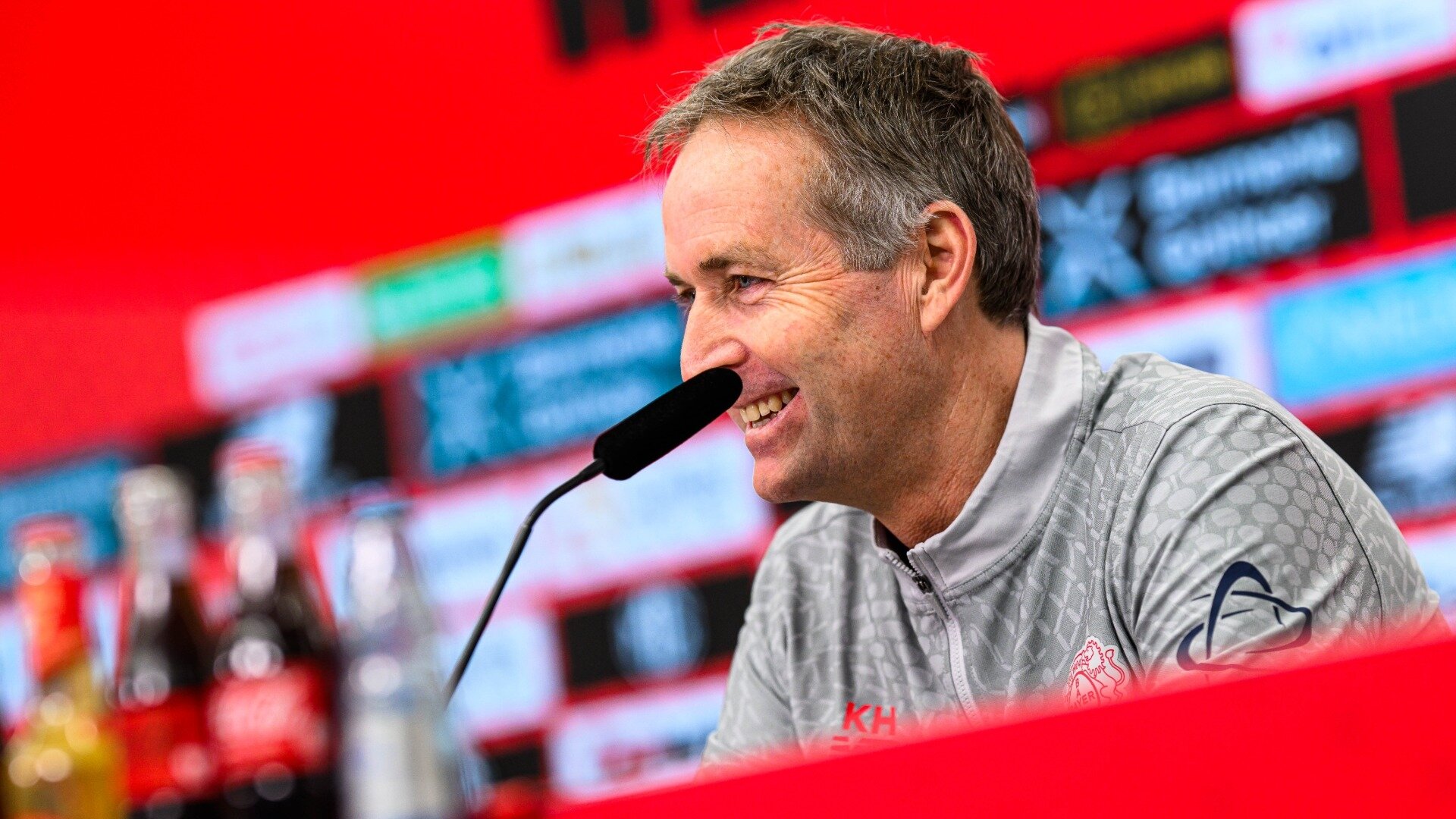
Hjulmand ahead of #B04FCSP: ‘Take a step forward in our quality’
In preparation for the Bundesliga home match against FC St. Pauli on Saturday, 14 February (kick-off: 15:30 CET), the Werkself had a full week of training for the first time since the first match in 2026. At the press conference ahead of the clash against the relegation-threatened Kiezkicker, coach Kasper Hjulmand spoke about the intensive work during the week and the lessons learnt. The Dane also announced the good news that Ibrahim Maza is available again.
Show more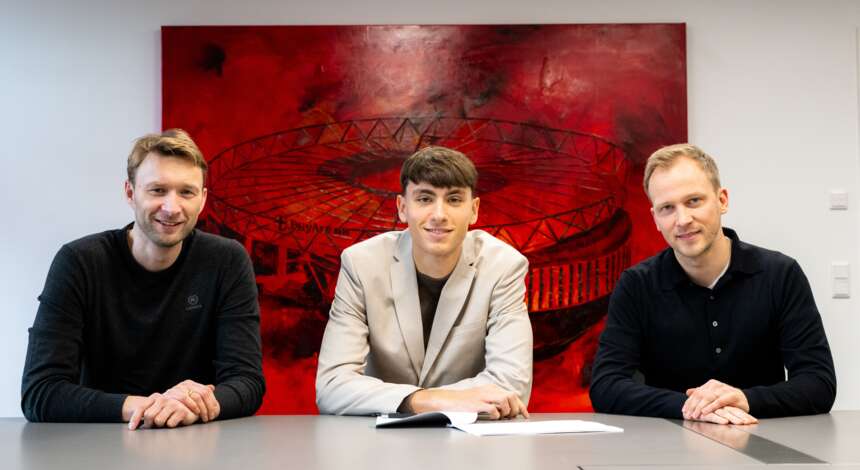
Bayer 04 sign striker Aleksa Damjanovic from Red Star Belgrade
Bayer 04 Leverkusen are strengthening the squad for next season with the addition of Serbia U19 international Aleksa Damjanovic. The 17-year-old centre-forward is set to join the Bundesliga club in the summer from Serbian champions Red Star Belgrade. Damjanovic, who also has Austrian citizenship, has signed a long-term contract.
Show more